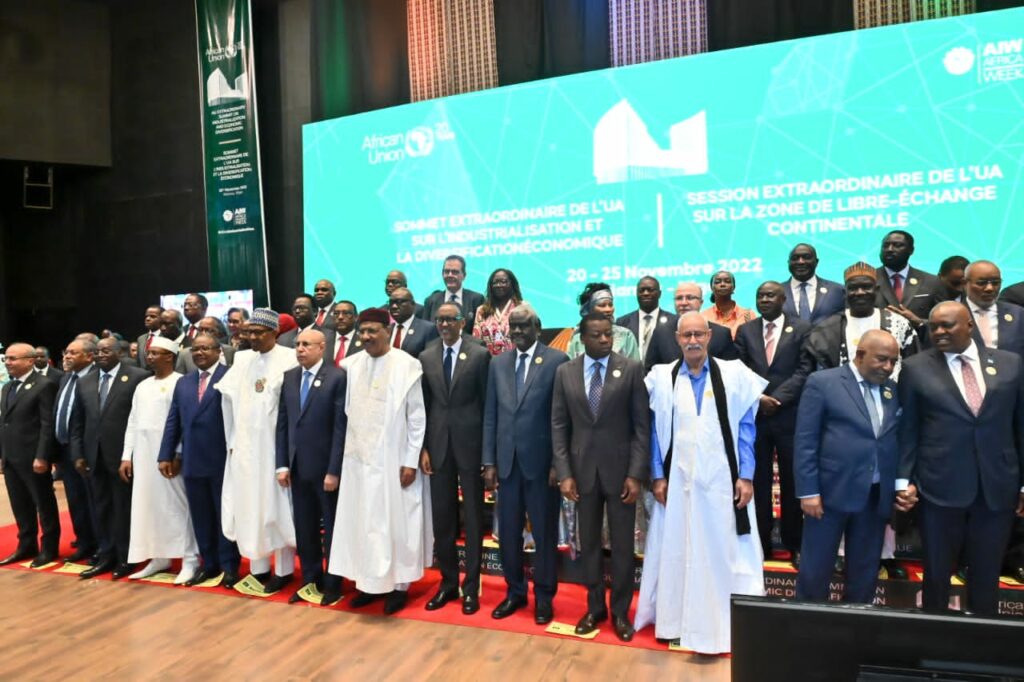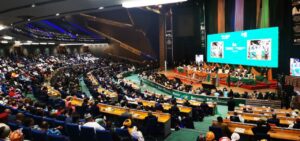African leaders marshal momentum for continental industrialization and AfCFTA

It was a normal sunny day, Friday November 25, 2022 in Niamey, the Nigerien capital. In the main hall of the Mahatma Ghandi Conference Centre, African leaders from north, east, west, central and south of the continent had gathered. That whole week starting from November 20, the Africa Industrialisation week has been re-echoed in meetings, deliberations and clarion calls were made – challenging, goading on and recommending how Africa can harness its full potential to industrialized.
At this momentous gathering, the 17th Extra-Ordinary Assembly of the African Union on Industrialisation, led by the host President, Mohamed Bazoum, ably supported by President Paul Kagame of Rwanda, who sat in for President Macky Sall of Senegal, rousing speeches were made, by presidents, leaders of financial and developmental institutions, urging on the continent to take its chances and work towards industrialization, in spite of all the challenges, most of them surmountable.
President Paul Kagame who pointed out that the pace of industrialisation in Africa remains too slow to achieve the continent’s objectives and Agenda 2063, called on the leaders to invest resources in energy.
“To create impact, we must move forward in unison with a sense of urgency. Times have changed and the economy is more important than ever. We are reminded of working together. No one can work alone,” he said, adding, “We have a choice to make. The future is in our hands. Let’s go ahead and make the right choice.”
The Chairperson of the African Union Commission (AUC) Moussa Faki Mahamat called for renewed commitment to industrialization, and asked African countries to question the past, and identify the factors that held back the continent’s march towards industrialization.
Taking note of the challenges of terrorism, he said agriculture opens the gateway to industrialisation and stated that the Malabo Declaration even makes that possible.
In his welcome address, President Bazoum said the Summit is a testimony to the leadership of the AUC to fasttrack industrialization, adding that industrialiasation and trade go hand-in-hand.
“The industrialization of Africa will only be possible if we implement the African Continental Free Trade Area. We must define what kind of industrialization we want. Questions such as how and why do we want to industrialise, show that we are on the right path,” he said.
Reflecting on trade, he said currently Africa’s contribution to global trade stands at around 4 per cent, while intra-African trade is 17 per cent of global trade. He therefore indicated that “understanding the global trend would be useful in understanding what we must do. We must define our priorities that would inform how we industrialise,” he said, adding that, “our priorities must be on how to feed our people, provide water and information technology that would be useful to us.”
Commenting on the outcomes of the just-ended COP27, he said, “COP decisions are not helpful to our continent. We can’t do without fossil fuels. The energy sources we are being asked to use are just ‘mirrors’,” he said, urging African leaders to among other things invest in the youth of the continent.
Professor Benedict Oramah, President of the Afreximbank indicated how the Bank has pursued initiatives and programmes that directly address the needs of Africans, as espoused in “Agenda 2063: the Africa We Want.”
“It was on the platform of your support that Afreximbank intervened strongly during the COVID-19 Pandemic, disbursing over $8 billion to central and commercial banks to avert looming trade debt payment defaults and support the procurement of test kits, PPEs and other COVID-19 containment materials. It was your trust and confidence that made it possible for Afreximbank to support the first ever pooled procurement by African Union Member States in an emergency, when it provided a $2 billion financing towards the procurement of 220 million doses of of Johnson and Johnson COVID-19 vaccines.
And as the Ukraine crisis rages, your Bank has also stepped up and already disbursed over $5 billion towards the procurement of food, fertilizer and grains by Member States and businesses. Working with UNECA, the AU and the AfCFTA Secretariat, we have also created a pooled procurement platform called the Africa Trade Exchange (ATEX), that is helping African countries to procure grains, edible oils and fertilizers at a much reduced cost,” he said.
According to Prof Oramah, Afreximbank, the AUC and the AfCFTA Secretariat have launched the commercial operations of the Pan-African Payment and Settlement System (PAPSS).
“It has now become possible to conduct intra-African trade payments in African national currencies. Today, a Nigerian can buy a product from Ghana and pay in naira. The Ghanian seller will receive in cedis. Overtime PAPSS will spread across Africa. When that happens, we aim to save the continent at least $5 billion in transfer and settlement charges, while returning to our continent trades that are diverted to non-African markets due to use of third currencies to pay for intra-African trade,” he said.

In his remarks, Gerd Muller, the Director-General of UNIDO, pointed the important fact that understanding Africa means understanding its diversity, its differences and its sheer size.
“Africa is the growth continent of the 21st century,” he said.
“You have a young population, which will double by 2050. This offers many opportunities. However, currently the many dramatic crises are hitting Africa particularly hard: The COVID-19 pandemic, with the ongoing severe economic consequences. Exploding costs for energy and grain especially because of the war in Ukraine. And climate change with drought, floods and related disasters in many countries,” he added.
While stating that Africa is not responsible for any of these crises, he called on the rich industrialised countries to take on the responsibility, for the economic and financial impacts.
“Excellencies, ladies and gentlemen, You do not need others telling you what to do. What is needed is simple: justice, fair markets, fair trade, and access to finance on fair conditions. To put it concretely, this is what is necessary: First, debt relief for the Less Developed countries (LDCs). Industrialized countries – the USA, European and others must support their economies not with billions but with trillions. Second, African countries and LDCs in the world need effective support from the IMF and the World Bank. With the African Continental Free Trade Area, you have undertaken a huge and promising project,” he said.
In remarks read on his behalf, the President of the African Development Bank, Dr Akinwumi Adesina said the African Continental Free Trade Area is the continent’s best pathway to prosperity.
“To unlock its potential, however, we must not just trade. We must turn the zone into an industrial manufacturing zone. Free Trade Zones that launch prosperity around the world have done so not by trading low value commodities, but by industrial manufacturing.
Without any doubt, Africa’s wealth must no longer depend on exports of raw materials but of finished value-added products. The door to poverty is from export of raw materials, the highway to wealth is industrialization.
The sector with the greatest potential for industrialization in Africa is agriculture. Africa has 65 per cent of the uncultivated arable land left to feed the world, therefore how Africa develops its agriculture will determine the future of food in the world. Across Africa, we must turn cocoa beans into chocolates, cotton into textile and garments, coffee beans into brewed coffee. That is why the African Development Bank is investing $25 billion in agriculture across the continent, to transform the agricultural sector,” he said.
At the end of the Summit, the leaders resolved to pursue the agenda to attain the objectives of industrialisation of the continent.
By Emmanuel K Dogbevi, in Niamey, Niger
Copyright ©2022 by NewsBridge Africa
All rights reserved. This article or any portion thereof may not be reproduced or used in any manner whatsoever without the express written permission of the publisher except for the use of brief quotations in reviews.

Great representation, plans and content. Thank you.